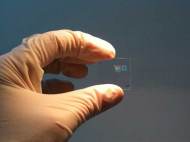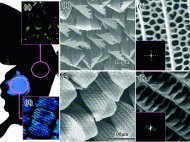Polymer batteries for cheaper and safer next-generation electronics
 Rechargeable lithium-ion batteries are now the power of choice for a variety of portable consumer electronics. A group of researchers from the University of Leeds has invented a new type of polymer gel that could replace the liquid electrolytes currently used in rechargeable lithium cells. It would also enable production of cheaper lithium batteries without compromising performance.
Rechargeable lithium-ion batteries are now the power of choice for a variety of portable consumer electronics. A group of researchers from the University of Leeds has invented a new type of polymer gel that could replace the liquid electrolytes currently used in rechargeable lithium cells. It would also enable production of cheaper lithium batteries without compromising performance.
Traditional lithium-ion batteries are based on cells (sealed containers) which contain a porous polymer film separator and a liquid chemical filler. This allows lithium ions which carry the charge to flow between the two electrodes, while acting as a barrier which holds the electrodes apart to prevent short-circuiting.
The polymer gel developed by Professor Ian Ward FRS, a Research Professor of Physics at the University of Leeds, and his team removes the need for this separator. Furthermore, the gel can be made into a thin, flexible film via a fully automated process that is fast, efficient and low cost.
They developed a patented manufacturing process called extrusion/lamination which sandwiches the gel between an anode and cathode at high speed (10 meters per minute) to create a highly-conductive strip that is just nanometres thick. The resultant polymer gel film can be cut to any size and permits a fully-automated process which is cost effective and safe. The lamination process also seals the electrodes together so that there is no excess flammable solvent and liquid electrolyte.
“The polymer gel looks like a solid film, but it actually contains about 70% liquid electrolyte”, said Professor Ward. “It’s made using the same principles as making a jelly: you add lots of hot water to ‘gelatine’ – in this case there is a polymer and electrolyte mix – and as it cools it sets to form a solid but flexible mass.”
Aside being safe and damage tolerant, the flexible cells can be shaped and bent to fit the geometries of virtually any device. The technology has been licensed to the American company Polystor Energy Corporation, which is conducting trials to commercialize cells for portable consumer electronics.









Polymer batteries will be future energy storage option.
Dr.A.Jagadeesh Nellore(AP),India
E-mail: anumakonda.jagadeesh@gmail.com